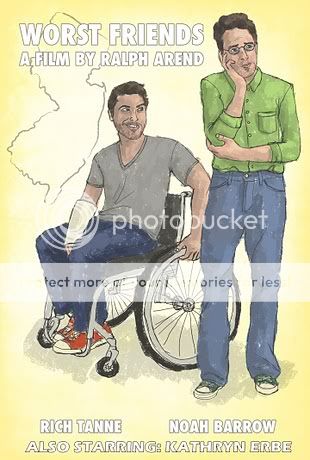The drama begins and ends in 1966, with the Nixons in their New York
apartment, discussing whether or not he’ll run for president in 1968. In
between come scenes from the political firestorm that culminated in the
Checkers speech — and the emotional damage it did to both Nixons. The
Checkers name came from Nixon’s mention in the speech of a cocker
spaniel that was sent as a gift to his daughters.
Nixon, Mr. McGrath said over a meal last month at the Union Square Cafe,
is “one of the few people I know who can be hateful and pitiable at the
same time, which is kind of maddening.” He laughed. “We like a cleaner
feeling. You just want to hate someone, or pity him, but not both. It’s
that essentially human quality of Nixon’s that everyone connects with in
some way: that fear, that social insecurity, that inability to feel
loved or popular.”
It’s hard to imagine someone less Nixonian than Mr. McGrath, 54.
Effervescent and boyish, he has a boulevardier’s bounce and a
performer’s panache. He’s also extremely droll, a word rarely used in
proximity to the term “Nixonian.” When a diner asked a waiter about
“speck” on the menu (it’s a kind of dried ham), Mr. McGrath nodded. “Oh,
I’m very familiar with that. My whole life is on spec.”
Earlier, during a break in rehearsal at the Vineyard, an actor in
costume took out his smartphone. An onlooker remarked on the
incongruity. “It’s an ikePhone,” Mr. McGrath said.
“A gentleman playwright from another era” is how Ms. Erbe described him
in a telephone interview. “He really is like you’d imagine someone from
the Algonquin Round Table.” (In a curious twist Ms. Erbe used to be
married to Terry Kinney, the play’s director. “She’s someone who came to
mind immediately,” Mr. Kinney said in a telephone interview. Mr.
McGrath spoke with admiration of how smoothly the couple has worked
together on the play.)
Mr. McGrath grew up in Midland, Texas. His parents, transplants from the
East, were conservative Republicans. “I can remember my sister and me
volunteering for Nixon,” Mr. McGrath said. “My parents liked him. I
liked my parents. So I figured he was good.”
There’s another Nixon-McGrath connection. A great-aunt who lived at the
corner of Fifth Avenue and 79th Street was selling her apartment when
the Nixons were moving to New York for the second time, in the late
1970s. Pat came by to look at it. A week later an inscribed copy of
“RN,” Richard Nixon’s memoirs, arrived. “Aunt Allie was very happy about
that,” Mr. McGrath said. “Very happy.”
Mr. McGrath eventually came East, to go to Choate. Later, at Princeton,
he got his playwriting start, with the Triangle Club’s famous
theatricals. A stint as a staff writer at “Saturday Night Live” was
followed by a variety of writing credits for stage, television and film.
Among them was a collaboration with Woody Allen on
“Bullets Over Broadway,” which earned an Oscar nomination for best original screenplay. Mr. McGrath directed his first feature film,
“Emma,” starring Gwyneth Paltrow, in 1996. Four others have followed. The most recent was last year’s
“I Don’t Know How She Does It,” starring Sarah Jessica Parker. He’s also acted.
Originally Mr. McGrath thought of Nixon as a possible television
subject. “Since cable got the power and freedom it has, you can explore
someone in a way you couldn’t in the old days” of network television,
“when
Mannix was Mannix was Mannix," he said. “I thought maybe that Nixon would be an interesting series.”
So how did “Checkers” end up Off Broadway instead of on HBO or Showtime?
“As I studied the speech, it kind of had a perfect shape,” Mr. McGrath
said. “It has a dramatic beginning. He’s under attack. Things go wrong.
He resolves it successfully. Yet from a dramatic point of view it has
this beautiful twist.” He added, “It allowed him to go forward in
politics, but the whole event made her realize she hated politics.”
While “Checkers” certainly works as a title, the play might just as
accurately be called “Scenes from a Marriage” or “Nixon/Nixon” — the
other Nixon being Pat.
Anthony LaPaglia “and I were talking the other day,” Mr. McGrath
recalled, “and he said, ‘Do you think Nixon loved Pat more than politics
or politics more than Pat?’ We know about a lot of presidents who
didn’t love their wives, who had arrangements or whatever. I think he
genuinely loved Pat. But in the end I think he did love politics more
than Pat, because it fed some need of his that she couldn’t feed.”
Ms. Erbe praised the playwright’s rendering of her character. “Doug
really empathizes with her and has written her so beautifully,” she
said. “I don’t want to feel I let her down.”
Mr. McGrath expressed a similar protectiveness. “She has a delicacy of
feeling I associate with” Tennessee Williams, “though some of those
women can be quite fantastical. Sadly, she wasn’t out of touch with
reality. She was very in touch with reality, which was difficult for
her.
“At the end of the play she says, ‘I can’t stand it if you win or if you
lose.’ That’s what makes their story a tragedy — not just a drama but a
tragedy. There’s no way for them to be happy at a certain point.
There’s no way, because neither can change.”
Did that make it hard for Mr. McGrath to write about Pat Nixon? “No, I
actually loved writing about her,” he said. “In some ways that’s what I
loved writing about most because I tried to imagine what if I were
Nixon’s wife. Now there’s a title, ‘What If I Were Nixon’s Wife.’ Talk
about waking up from a dream in a cold sweat.”
P.S. Vineyard Theater plans to open on Tuesday again. Check their
account for updates.















